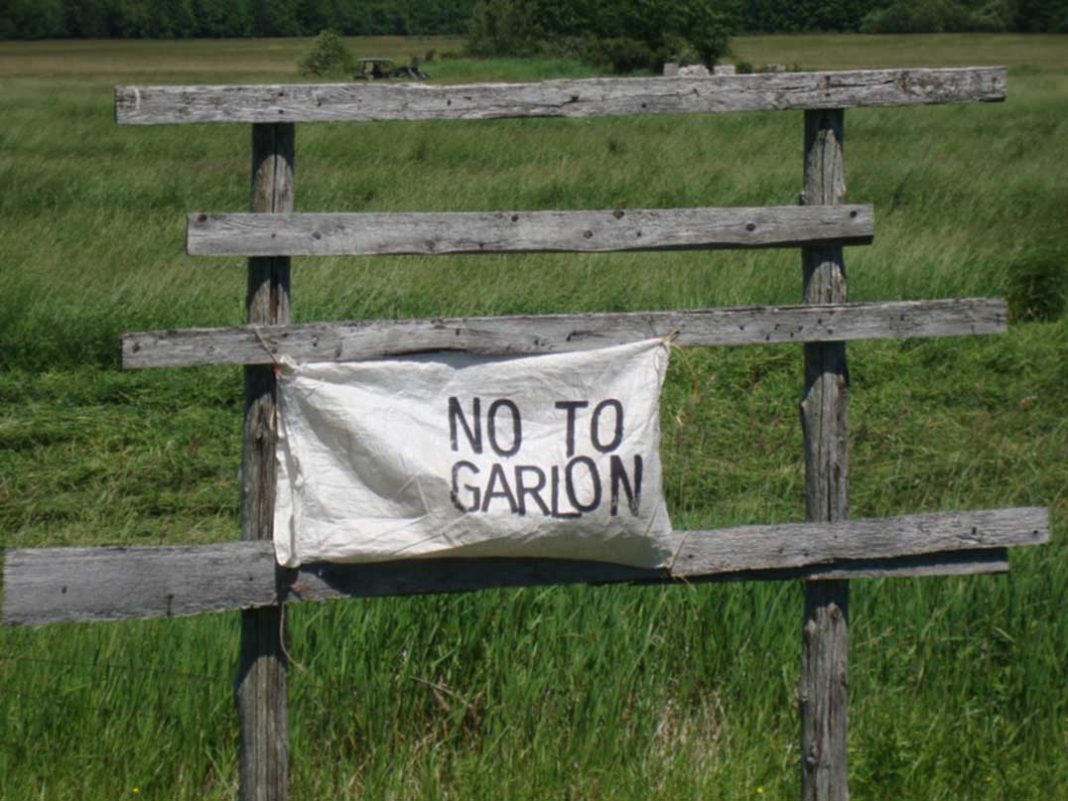TEHKUMMAH––A group of concerned citizens met at the Tehkummah home of George Kopylov last Saturday, April 28 to brainstorm ideas and develop a strategy for holding the utility companies and other organizations accountable for their use of pesticides and herbicides on public land on Manitoulin Island.
Last summer Mr. Kopylov saw a notice posted in this newspaper by the Ministry of Transportation (MTO) regarding the application of pesticides on Hwy 542A. He was concerned with the vague location given in the notice and that only three days advance notice was given when the Pesticide Act and Regulations, Part V, Reg. 309 states that a minimum of 10 days’ notice must be given. He took his concerns to Tehkummah council.
Council passed the following resolution, moved by (former) Councillor Laird Lee, seconded by Councillor Ron Hierons: “Whereas the residents of the Township of Tehkummah have presented concerns regarding the Ministry of Transportation herbicide spraying program with the Township of Tehkummah; and whereas the council for the Township of Tehkummah deems these concerns to be valid and representative of the municipal residents, be it resolved that the Ministry of Transportation be advised that the Township of Tehkummah is to be deemed a ‘no spray zone’ for herbicide spraying effective immediately; and that the clerk-treasurer shall research and draft the appropriate policy which will address and enforce this restricted use zone’ and that this municipal council contact the Ministry of Environment for a report of the spraying program carried out in Tehkummah by DBI under MTO direction.”
However, the Cosmetic Pesticides Ban Act that came into effect on April 22, 2009 rendered any existing or future municipal bylaws concerning pesticides use inoperable. The legislation restricted the sale of many pesticides, with exceptions for farming, forestry, health and safety use and golf courses.
Frustrated with a lack of action by the township, Mr. Kopylov decided to take matters into his own hands and organized a meeting for like-minded community members. Eighteen citizens from Tehkummah and other Island communities attended the inaugural meeting.
One participant thought that spraying by MTO contractor DBI occurred too close to a Manitoulin Streams river rehabilitation project last year. Another remembered an incident from several years ago where pesticides were applied irresponsibly and without notice in the Spring Bay area.
It was noted that neonicotinoids (the pesticides responsible for the demise of honeybees) were banned in the European Union (EU) last week with a phase-out period of six months. One of the arguments for the EU ban was the declining bird population due to loss of insects as their food source due to neonicotinoid use. One participant suggested that Manitoulin should strive to be 100 percent organic. “We are known for our natural landscape and clean water,” it was stated. “What do we tell our children when it’s gone?”
Four key points agreed upon were that more notice is needed before any spraying occurs; that plants along the roadsides are used by people; that water must be kept clean; and that known carcinogens released into the environment must not go undetected.
Options for action were discussed. Moving forward the focus will be concentrated on pesticide and herbicide use on public lands and not private land. “Pick the fight we can win,” it was agreed.
While municipalities are unable to implement or enforce bylaws regarding pesticide use it was suggested that citizens request councils to make a public statement to the utilities and other organization that the municipality does not endorse the use of pesticides or herbicides on public properties within their boundaries. A draft public statement should be provided to all Island municipalities. The statement should request advance notice and additional information on proposed sprayings while stressing council’s opposition in principle to pesticide applications. In 2002 Assiginack made a similar statement that is still effective today, it was noted.
Public pressure is also the theory behind the collection of signatures on a petition and the use of interested observers when spraying is taking place. Another suggestion was connecting with other grassroots anti-pesticides groups and use numbers and the media to add power to the message.
With provincial and municipal elections fast approaching, people are reminded to ask questions of candidates and to use the power of their vote.
There was general agreement as to a number of tactics and actions that could be taken. Maintaining forward momentum and minimizing duplication was then discussed. It was agreed that committees should be struck in order to streamline efforts, keeping in mind everyone’s busy lives. “It has to be fun,” someone remarked, “and there has to be food.”
The next meeting will be held at 2 pm on May 26. Email
george.kopylov@gmail.com for more information.




